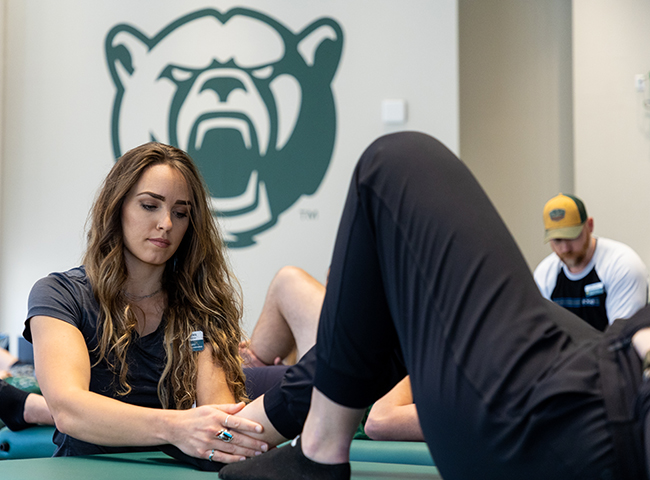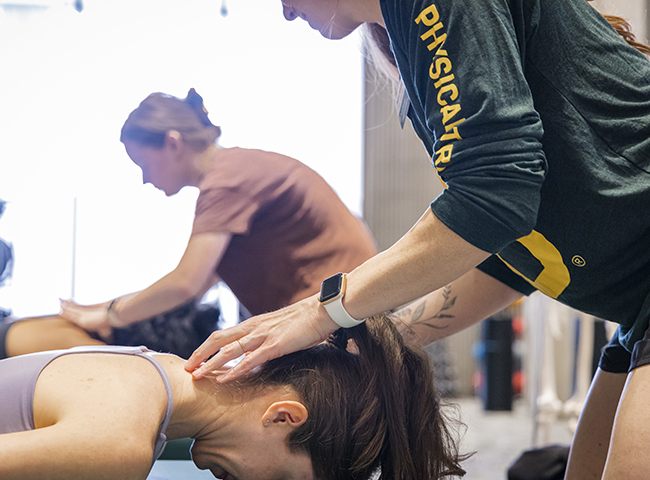Clinical Education Overview
Clinical education provides students with exposure to a variety of physical therapy practice settings and a wide range of patient populations across the lifespan. These full-time experiences take place during the second year of study and immerse students into clinical settings as they learn to perform as a Doctor of Physical Therapy. Clinical education experiences provide students the opportunity to apply their knowledge and skills to clinical situations under the direct supervision and guidance of experienced physical therapist clinicians. In clinical learning environments, students develop safe and effective skills in all aspects of patient care while also developing the ability to work as part of an interdisciplinary healthcare team.
At Baylor University, our extensive clinical education team works individually with students to identify clinical education experiences.
Our unique approach to clinical education placement incorporates a high-level of student input along with an attentive focus toward each student's personal goals and professional aspirations.
Clinical Education Curriculum
Students complete 31 weeks of full-time clinical education, which include both inpatient and outpatient experiences as well as possible specialty-focused experiences. In each clinical experience, students spend a minimum of 36 hours per week in direct patient care and 2-4 hours/week in concurrent didactic coursework.
Prior to the first clinical education experience, students complete all foundational patient management coursework, ensuring that they are fully prepared to treat patients with musculoskeletal, neurologic, and cardiopulmonary dysfunctions in a variety of inpatient practice settings.
Our DPT clinical education curriculum includes:
- 8-week clinical experience in the 4th academic term
- 8-week clinical experience in the 5th academic term
- 15-week clinical experience in the 6th academic term
Students receive training in a variety of practice settings that represent the full range of the physical therapy profession. Through intentional placements, students will experience a minimum of two clinical practice settings, including general outpatient physical therapy practice and a second setting within the inpatient continuum of care, such as acute hospital, post-acute, rehabilitation, skilled nursing, home health, etc. Also, students generally experience a variety of specialty areas, which may include orthopedics, neurologic, pediatrics, geriatrics, sports medicine, aquatics, women's health, cardiovascular and pulmonary, and wound care.
In some instances, due to student interest or clinical preference, the final two clinical education courses may be combined into a 23-week rotation.
Clinical Education Highlights
Standardized Placements:
Clinical placements are sequenced in inpatient, outpatient, and specialty practice settings to provide the majority of students with similar learning experiences and clinical skill development across all three clinical education courses.
Integrated Curriculum:
Didactic courses taken concurrently during clinical education allow students to "bring the classroom into the clinic, and the clinic into the classroom." Students directly apply the concepts learned in these didactic courses to their patients.
Career-Focused:
The potential for a terminal clinical rotation experience in a specialty concentration allows students to align their clinical education with their professional practice goals. These terminal experiences fully prepare students for post-professional residency opportunities and/or entry-level practice in a clinical practice setting of their choosing.
Post-professional Residency Opportunities:
Baylor University’s Doctor of Physical Therapy program graduates are well-prepared to apply for and excel in post-professional residencies. If this is of interest, faculty will help prepare you for residency expectations and the competitive application process. One benefit is that you can potentially complete the entire DPT curriculum and residency in three years—the normal timeframe for most DPT programs alone.
Clinical Instructor Faculty:
Clinical instructor faculty are an integral part of our clinical experiences for students. Many of our clinical instructors assist in lab immersion sessions as associated faculty. This unique lab faculty model provides students with early opportunities to get to know their future instructors and keeps our instructors up-to-date on advances in DPT education. Many of the clinical faculty in the final clinical rotation experience are specialists in their field, have completed residency or fellowship training, and are chosen for their expertise and eagerness to work with students.
Clinical education is a key component in preparing our graduates for successful entry into the profession of physical therapy.
We are committed to providing opportunities that will allow our students to work in a wide variety of settings and be prepared for licensed practice upon graduation. The profession of physical therapy is moving forward, and our clinical education program is focused on keeping our graduates ahead of the curve.


